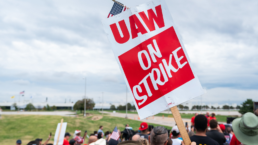By having contracts with all the Big Three automakers expire on May Day, 2028, the UAW president also issued a challenge to the labor movement. Will his union be ready to meet it?
by Jonathan Rosenblum, The Nation
Imagine it’s the evening of April 30, 2028. The nation is roiling as millions of workers coast to coast prepare to walk off the job in an unprecedented May Day national strike. Workers in manufacturing, logistics, healthcare, grocery, high tech, hospitality, and public services have mobilized and committed to bring the economy to a halt unless their bold demands are met: Medicare for All, a $30/hour minimum wage, and a tax on billionaires to massively increase public education funding.
That’s the sort of vision that United Auto Workers (UAW) President Shawn Fain has challenged the rest of the labor movement to begin organizing toward.

At the end of October, in announcing strike settlements at the Big Three auto companies, Fain noted that the UAW contracts all expire the day before May Day 2028. He urged other unions to align their contracts with the UAW. “If we’re truly going to take on the billionaire class and rebuild the economy so that it starts to work for the many and not the few, then it’s important that we not only strike, but that we strike together,” he said.
Workers have organized national strikes in other countries, where labor movements are stronger and there’s a history of national bargaining around social demands. Not so in the US, where the post-WWII political establishment—too often with the complicity of union leaders—intentionally created and enforced a labor law framework that partitioned the working class by establishing bargaining at the enterprise level, rather than by sector or whole industries. In the US system, workers are left to fight separate battles, worksite by worksite, for health care, fair pay, and health and safety rights—things we’re more powerful fighting for together.
Recent Posts
“Arrest Now, Ask Questions Later”: Why Did L.A. ICE Agents Arrest and Jail U.S. Citizen Andrea Velez?
July 3, 2025
Take Action Now “They didn’t have vests that said ICE or anything. Their cars didn’t have license plates. … Just because of the color of our…
Trump’s Big, Beautiful Bill Is Naked Class War
July 3, 2025
Take Action Now Trump’s “Big, Beautiful Bill” trades tax cuts on millionaires for the dissolution of society.By Hamilton Nolan, In These Times…
Mayor Mamdani’s First Day, A Zero Hour Conversation With Richard Wolff
July 2, 2025
Take Action Now If elected, what would Mayor Mamdani do on his first day in City Hall? How would a democratic socialist govern as a big-city mayor?……
The U.S. Is Funding A Bloodbath At Gaza Aid Centers
July 2, 2025
Take Action Now The admin just gave $30M to GHF, the organization at the center of charges that Israel is weaponizing assistance and shooting at…




